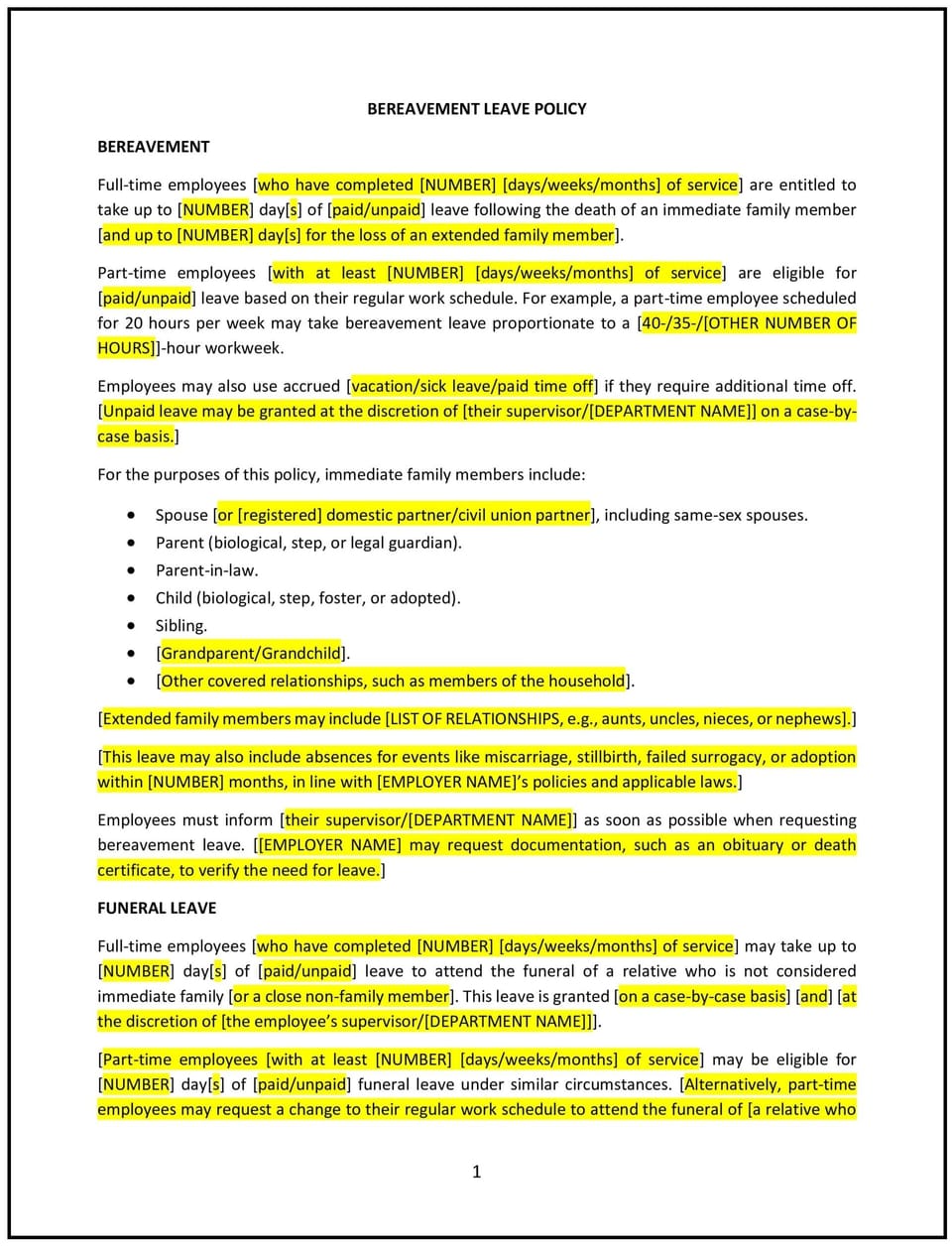Bereavement leave policy (Arizona): Free template

Bereavement leave policy (Arizona)
In Arizona, a bereavement leave policy helps businesses provide employees with time off to grieve and manage personal matters following the death of a loved one. While Arizona does not mandate bereavement leave, offering this benefit supports employee well-being and demonstrates compassion during difficult times.
This policy outlines eligibility, the amount of leave available, and the process for requesting bereavement leave. By implementing a clear policy, businesses can promote fairness and understanding while balancing operational needs.
How to use this bereavement leave policy (Arizona)
- Define eligibility: Specify who qualifies for bereavement leave, including full-time, part-time, or temporary employees, and the relationships covered, such as immediate family or close relatives.
- Establish leave duration: Outline the standard number of days offered, such as 3–5 days, and any additional provisions for extended leave if needed.
- Provide a request process: Detail how employees can request bereavement leave, including required notice and any documentation, such as an obituary or funeral program, if applicable.
- Include flexibility: Allow for adjustments based on unique circumstances, such as travel requirements or cultural practices.
- Communicate expectations: Clarify any guidelines for returning to work, such as notifying supervisors or providing updates during extended absences.
Benefits of using a bereavement leave policy (Arizona)
This policy offers several advantages for Arizona businesses:
- Supports employee well-being: Provides employees with time to grieve, reducing stress and improving morale.
- Promotes fairness: Establishes consistent guidelines for granting leave, ensuring equitable treatment of all employees.
- Improves retention: Demonstrates compassion, fostering loyalty and a positive workplace culture.
- Enhances productivity: Allows employees to process grief before returning to work, minimizing distractions and absenteeism.
- Reduces disputes: Clarifies expectations, preventing misunderstandings or conflicts regarding leave requests.
Tips for using a bereavement leave policy (Arizona)
- Address Arizona-specific considerations: Adapt the policy to accommodate the diverse cultural and familial structures common in Arizona.
- Include additional leave options: Provide guidance for employees needing extended time off, such as using vacation or unpaid leave if necessary.
- Train supervisors: Ensure managers understand the policy and can respond sensitively to bereavement leave requests.
- Maintain documentation: Keep records of bereavement leave requests to ensure consistency and legal compliance.
- Review and update regularly: Periodically evaluate the policy to ensure it meets employee needs and aligns with business operations.
Q: How many days of bereavement leave are typically offered?
A: Businesses commonly offer 3–5 days of bereavement leave, with additional provisions for extended leave based on specific circumstances, such as travel needs.
Q: Is bereavement leave paid in Arizona?
A: While Arizona does not require paid bereavement leave, many businesses choose to offer paid time off to support their employees.
Q: What relationships are covered under this policy?
A: Typically, immediate family members such as parents, siblings, spouses, and children are covered, but businesses can extend the policy to include grandparents, in-laws, or other close relations.
Q: Can employees take additional time off if needed?
A: Yes, employees may use accrued vacation or unpaid leave if they require additional time beyond the standard bereavement leave.
Q: How should businesses handle documentation for bereavement leave?
A: Employers may request documentation, such as a funeral program or obituary, to verify the need for leave, but should do so with sensitivity and discretion.
This article contains general legal information and does not contain legal advice. Cobrief is not a law firm or a substitute for an attorney or law firm. The law is complex and changes often. For legal advice, please ask a lawyer.


